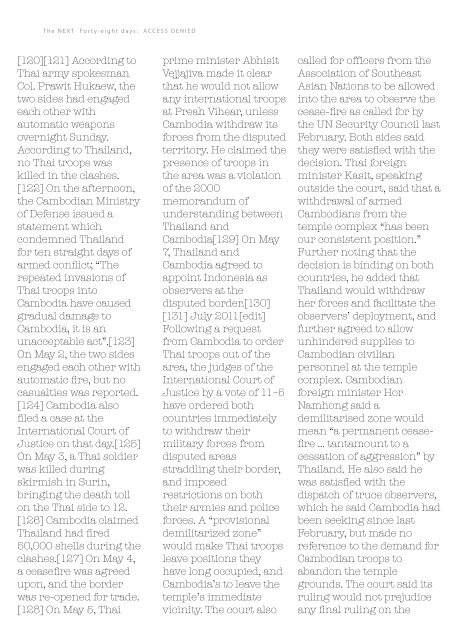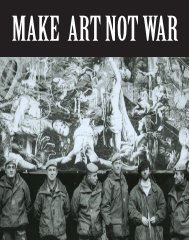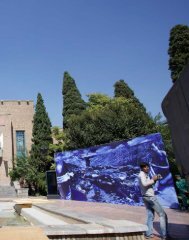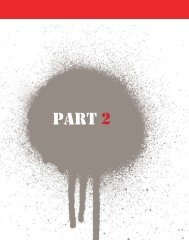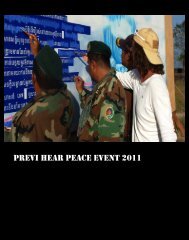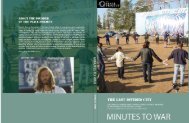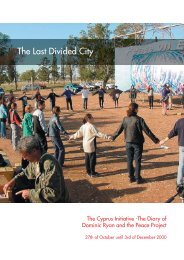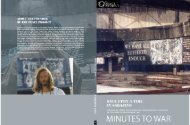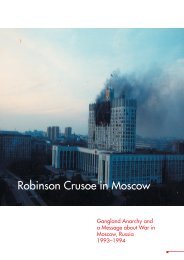You also want an ePaper? Increase the reach of your titles
YUMPU automatically turns print PDFs into web optimized ePapers that Google loves.
<strong>The</strong> NEXT Forty-eight days: ACCESS DENIED<br />
<strong>The</strong> NEXT Forty-eight days: ACCESS DENIED<br />
[120][121] According to<br />
Thai army spokesman<br />
Col. Prawit Hukaew, the<br />
two sides had engaged<br />
each other with<br />
automatic weapons<br />
overnight Sunday.<br />
According to Thailand,<br />
no Thai troops was<br />
killed in the clashes.<br />
[122] On the afternoon,<br />
the <strong>Cambodia</strong>n Ministry<br />
of Defense issued a<br />
statement which<br />
condemned Thailand<br />
for ten straight days of<br />
armed conflict; “<strong>The</strong><br />
repeated invasions of<br />
Thai troops into<br />
<strong>Cambodia</strong> have caused<br />
gradual damage to<br />
<strong>Cambodia</strong>, it is an<br />
unacceptable act”.[123]<br />
On May 2, the two sides<br />
engaged each other with<br />
automatic fire, but no<br />
casualties was reported.<br />
[124] <strong>Cambodia</strong> also<br />
filed a case at the<br />
International Court of<br />
Justice on that day.[125]<br />
On May 3, a Thai soldier<br />
was killed during<br />
skirmish in Surin,<br />
bringing the death toll<br />
on the Thai side to 12.<br />
[126] <strong>Cambodia</strong> claimed<br />
Thailand had fired<br />
50,000 shells during the<br />
clashes.[127] On May 4,<br />
a ceasefire was agreed<br />
upon, and the border<br />
was re-opened for trade.<br />
[128] On May 5, Thai<br />
prime minister Abhisit<br />
Vejjajiva made it clear<br />
that he would not allow<br />
any international troops<br />
at Preah Vihear, unless<br />
<strong>Cambodia</strong> withdraw its<br />
forces from the disputed<br />
territory. He claimed the<br />
presence of troops in<br />
the area was a violation<br />
of the 2000<br />
memorandum of<br />
understanding between<br />
Thailand and<br />
<strong>Cambodia</strong>[129] On May<br />
7, Thailand and<br />
<strong>Cambodia</strong> agreed to<br />
appoint Indonesia as<br />
observers at the<br />
disputed border.[130]<br />
[131] July <strong>2011</strong>[edit]<br />
Following a request<br />
from <strong>Cambodia</strong> to order<br />
Thai troops out of the<br />
area, the judges of the<br />
International Court of<br />
Justice by a vote of 11–5<br />
have ordered both<br />
countries immediately<br />
to withdraw their<br />
military forces from<br />
disputed areas<br />
straddling their border,<br />
and imposed<br />
restrictions on both<br />
their armies and police<br />
forces. A “provisional<br />
demilitarized zone”<br />
would make Thai troops<br />
leave positions they<br />
have long occupied, and<br />
<strong>Cambodia</strong>’s to leave the<br />
temple’s immediate<br />
vicinity. <strong>The</strong> court also<br />
called for officers from the<br />
Association of Southeast<br />
Asian Nations to be allowed<br />
into the area to observe the<br />
cease-fire as called for by<br />
the UN Security Council last<br />
February. Both sides said<br />
they were satisfied with the<br />
decision. Thai foreign<br />
minister Kasit, speaking<br />
outside the court, said that a<br />
withdrawal of armed<br />
<strong>Cambodia</strong>ns from the<br />
temple complex “has been<br />
our consistent position.”<br />
Further noting that the<br />
decision is binding on both<br />
countries, he added that<br />
Thailand would withdraw<br />
her forces and facilitate the<br />
observers’ deployment, and<br />
further agreed to allow<br />
unhindered supplies to<br />
<strong>Cambodia</strong>n civilian<br />
personnel at the temple<br />
complex. <strong>Cambodia</strong>n<br />
foreign minister Hor<br />
Namhong said a<br />
demilitarised zone would<br />
mean “a permanent ceasefire<br />
... tantamount to a<br />
cessation of aggression” by<br />
Thailand. He also said he<br />
was satisfied with the<br />
dispatch of truce observers,<br />
which he said <strong>Cambodia</strong> had<br />
been seeking since last<br />
February, but made no<br />
reference to the demand for<br />
<strong>Cambodia</strong>n troops to<br />
abandon the temple<br />
grounds. <strong>The</strong> court said its<br />
ruling would not prejudice<br />
any final ruling on the<br />
where the border in the<br />
area between Thailand<br />
and <strong>Cambodia</strong> should fall.<br />
It could take the court<br />
many months or even<br />
years to reach that<br />
decision.[132] But Abhisit,<br />
caretaker Prime Minister<br />
since the just- concluded<br />
Thai general election, said<br />
that Thai soldiers will not<br />
pull out from the disputed<br />
area until the military of<br />
both countries agree on<br />
the mutual withdrawal.<br />
“We need to talk to the<br />
<strong>Cambodia</strong>ns as the<br />
<strong>Cambodia</strong>ns also have to<br />
pull out their troops,”<br />
Abhisit said at a news<br />
conference in Bangkok.<br />
“So there has to be some<br />
kind of mechanism to<br />
verify, to do it in an<br />
orderly manner. And<br />
therefore it depends on<br />
the two sides to come<br />
together and talk,” he<br />
said, suggesting that an<br />
existing joint border<br />
committee would be the<br />
appropriate place to plan<br />
a coordinated pullback.<br />
[133] On July 23, one<br />
<strong>Cambodia</strong>n soldier was<br />
killed along the<br />
<strong>Cambodia</strong>n-Thai border<br />
while another was<br />
wounded. A local military<br />
commander stated that<br />
the soldiers death was a<br />
result of clashes<br />
provoked by Thai troops.<br />
Pok Sophal, a commander<br />
for the Oddar Meanchey’s<br />
Trapaing Prasat district,<br />
stated that “We had an<br />
appointment for the<br />
meeting [between the two<br />
sides], and when we were<br />
walking, they opened fire<br />
at our soldiers”. Thai<br />
spokesman Phay Siphan<br />
stated that the<br />
government was<br />
investigating the<br />
incident, but dismissed<br />
claims of armed clashes.<br />
[134][135] September <strong>2011</strong><br />
Football diplomacy[edit] <strong>The</strong><br />
general election resulted in a<br />
decisive victory for the Pheu<br />
Thai Party, with their leader,<br />
Ms. Yingluck Shinawatra,<br />
replacing Abhist as Prime<br />
Minister on August 5, <strong>2011</strong>.<br />
Many United Front for<br />
Democracy Against<br />
Dictatorship (UDD – also<br />
called “Red Shirts”) members<br />
were elected to the House of<br />
Representatives (“MPs” in<br />
press reports.) Core UDD<br />
leaders arranged with<br />
<strong>Cambodia</strong>n PM Hun Sen for a<br />
friendly football match to be<br />
played in Phnom Penh’s<br />
Olympic Stadium on<br />
September 24.[136] MP–and–<br />
UDD leaders Jatuporn<br />
Prompan and Natthawut<br />
Saikua were prohibited from<br />
leaving the country due to<br />
pending charges arising from<br />
the 2010 Thai political<br />
protests, so an attorney<br />
petitioned the Criminal Court


